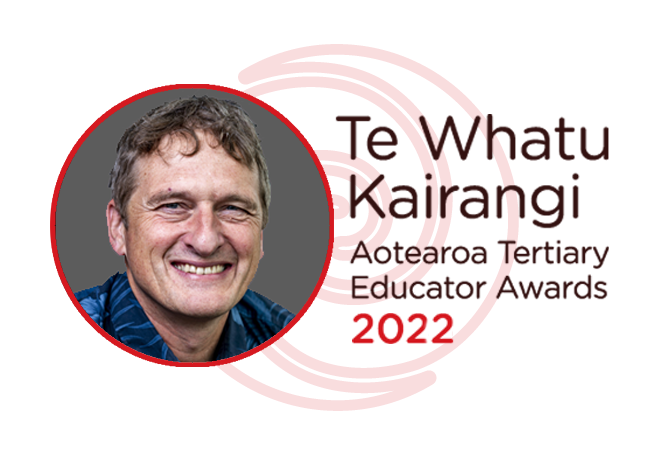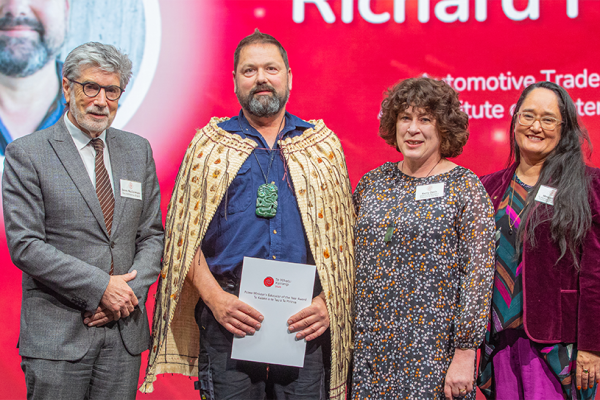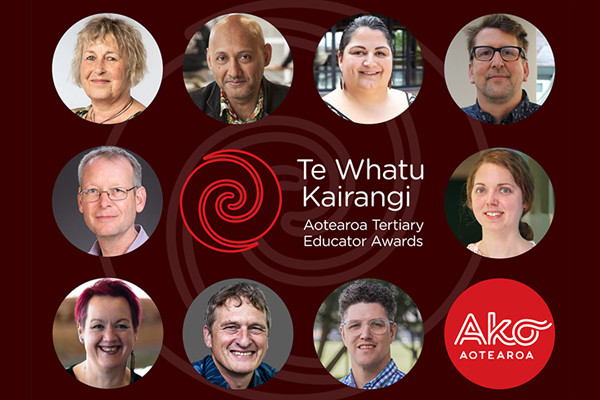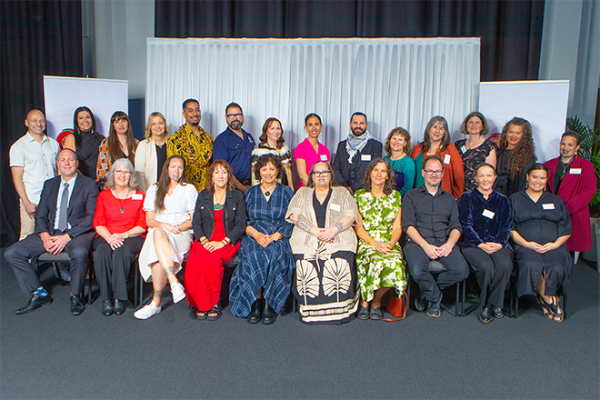Richard Easther
Helping others to aim for the stars
Category winner | Innovation in learning, teaching, and curriculum
Professor of Physics | Waipapa Taumata Rau | The University of Auckland
Watch Richard Easther's Teaching profile video
“My journey as a scientist, a teacher, a communicator, and as a leader, has convinced me that contributing to the learning and understanding of others often does more to advance our fields than our personal research.”
As a child Richard wanted to study the stars. The three decades he has spent exploring the origin and evolution of the Universe has fulfilled that childhood aspiration. But he found that, although university employment was seen as a key milestone for an aspiring scientist, the teaching component of these roles was not a big part of that narrative.
Richard’s key belief as a university teacher is that what happens in our classrooms is ours to shape. At the University of Auckland he helped rebuild the physics programme from the ground up, improving performance and progression through the undergraduate degree, and built a better framework for a rapidly growing PhD student population. His department has deepened engagement with Te Tiriti, strengthened support for Māori and Pasifika students, and became the first academic unit in New Zealand to gain a formal equity certification. He has co-created a nationally unique, faculty-wide scheme providing support, mentoring, and research opportunities to students pursuing science-based careers and this has inspired further programmes across the University. He also had a hand in the building and launching of New Zealand’s first satellite (outside of Rocket Lab itself) and, beyond the University, has contributed to major science communication initiatives in New Zealand and Australia.
When Richard joined the University of Auckland in late 2011 as Head of Department in Physics, he saw that the programme faced complex, interrelated challenges. In 2013 he generated momentum for change through an external review and, following this, convened Century Two, a research-informed working group charged with reassessing both curriculum and pedagogy. The project’s moniker alluded to the fact that 2014 was the Department’s 100th anniversary as a stand-alone unit, and Century Two’s purpose was to build a fit-for-purpose undergraduate offering as the department went into next 100 years. As a result, the University of Auckland was able to provide a world-class physics education in an inclusive learning environment where all students could realise their potential and develop quantitative, communication and collaborative skills to support their future success. Richard found that the broad international consensus on the core content of an undergraduate physics major meant that a first-year “physics with calculus” sequence required more high school preparation than many New Zealand students receive. Century Two designers were determined not to exclude students lacking this background, many of whom are in key equity groups. They addressed this challenge via top-down design and the principles of constructive alignment. Their solutions included multiple entry points, flexible core Stage One courses, a core curriculum at Stage Two, key mathematical topics included in Stage Two courses, and clear pathways in geophysics, medical physics, photonics, theory, and astrophysics.
To promote student engagement, Century Two introduced Studio Physics at Stage One, replacing traditional lectures with active learning. The junior laboratory was completely overhauled to create a dedicated 120-seat learning environment. Weekly tutorials were added at Stage Two, regular problems sessions at Stage Three, and opportunities to present and undertake independent investigations at Stage Four. The innovations in pedagogy, format, delivery and assessment were rolled out after two years’ preparation (2017-19) touching every course in physics. The biggest quantitative improvements in performance occurred at Stage Two, where the redesigned programmatic structure slashed an unacceptable failure rate. The most common passing grade rose from a C to an A, students began to master more challenging content, and there were clear improvements in problem-solving and group work.
Richard’s innovations focussed not only on undergraduates but also on the PhD cohort. During his headship the PhD population grew fivefold (from 12 to 60), reflecting the Department’s simultaneous research success. He introduced initiatives such as regular “cohort seminars”, formalised celebrations of student success, and the appointment of a departmental PhD Mentor. He boosted support for the University of Auckland’s Tuakana scheme in the department by recruiting tutors with strong cultural competence, increasing physics students’ engagement with Tuakana. An Equity Working Group was established in 2015, launching a conversation around gender, race, sexual orientation, and gender identity within the Department. It oversaw successful applications for Bronze (2016) and Silver (2018, 2020) Pleiades Awards, which recognise achievement and provide a framework within which equity issues can be identified and addressed. Richard’s emphasis on equity resulted in the proportion of non-male teaching staff rising from around to 5% to nearly 30%.
In 2014 Richard co-founded the University’s Science Scholars programme, a faculty-wide flagship aimed at recruiting and extending strong science students at the University by creating an “enrichment” programme across all disciplines in the Faculty. It was a first for New Zealand, incorporating features from programmes in the United States and Australia. It provides students with mentoring and exposes them to topics across the sciences, enabling them to think critically about the production of scientific knowledge, the relationships between Western science and Mātauranga Māori, the role of science in society, and the internal dynamics of the scientific community. Richard also helped develop the Auckland Programme for Space Systems [APSS], where student teams compete to design small satellites. The initial CubeSat, APSS-1, launched by Rocket Lab in November 2020, was the first satellite built and flown by any New Zealand organisation outside of Rocket Lab itself, a milestone for the University and the country.
Beyond the University, Richard is deeply involved with Science Communication as a practitioner and facilitator. He provided science advice for all episodes of the TV series Nigel Latta Blows Stuff Up and was a consultant for Brisbane’s successful bid to host the Australian offshoot of New York’s World Science Festival, running annually from 2016 to the present. In 2014 he instigated MoTAT’s now-annual STEM Fair and has helped bring science-themed programming to the Auckland Arts Festival, including productions by Dr Michelle Dickinson’s Nanogirl persona. Richard received 2020 Faculty and 2021 University awards for teaching leadership and, with his department, was awarded the inaugural Faculty of Science Departmental Teaching and Learning Award in 2018.
“We now live in a world in which brilliant lectures are available to all at the click of a mouse. However, my goal is always to build a community of learners rather than simply serving as a supplier of learning materials and opportunities. Active learning methodologies contribute to creating that community and are key to putting it to use."



